Nearly half of trans people have been a victim of hate crime in the last year
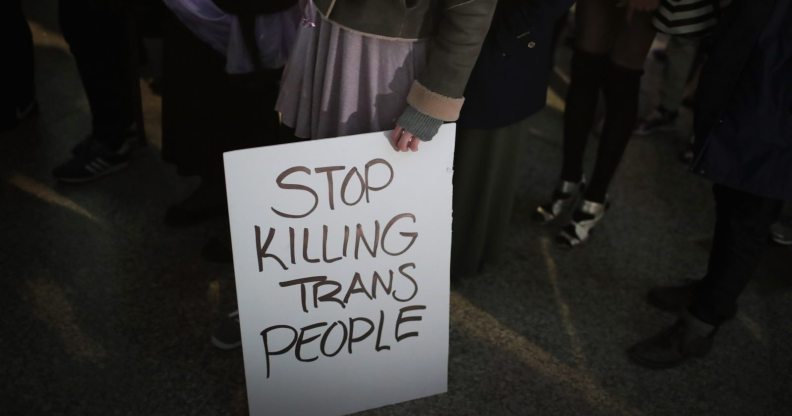
A candlelight vigil in Chicago. (Scott Olson/Getty)
A shocking report conducted by Stonewall and YouGov has found that transgender people face horrific levels of discrimination and hate crime in their home, work and social lives.
The research, which surveyed 871 trans and non-binary people in the UK, found that Britain’s trans community feel unsafe, and looking at the numbers we aren’t surprised.
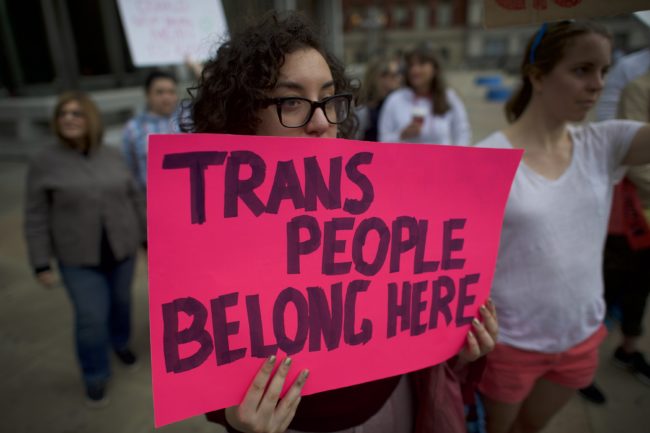
(Getty)
The most shocking revelation of the report was that four in 10 (41 percent) trans people have been a victim of hate crime in the past 12 months.
That’s more than double the amount of hate crime faced by LGB people, with 16 percent reporting that they had been a victim of hate crime because of their sexuality in 2017.
Stemming from the fear of discrimination, it was found that 51 percent of people hid their gender identity in the workplace.
As well as discrimination at work, 25 percent of trans people reported that they had faced discrimination when house hunting, 34 percent had been discriminated against in public spaces such as cafes, restaurants or bars and nearly half (48 percent) of trans people avoid using public toilets because they fear they will be harassed or discriminated against.
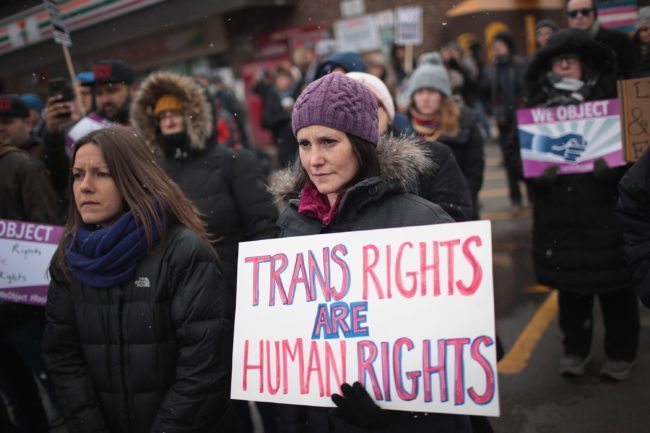
(Photo by Scott Olson/Getty Images)
Related: A trans review of 2017: the year of transgender moral panic
Esme, 32, from Scotland, explained that they were sick of the discrimination.
They said: “We are constantly questioned on our existence, treated hostilely and ridiculed in the name of debate.
“We are constantly exposed to hate and criticism in the media and daily life as the public respond to the media’s attitudes. I’m sick of being described as a mentally ill freak.”
Sadly, over a quarter (28 percent) of those in a relationship had faced domestic abuse from their partner.
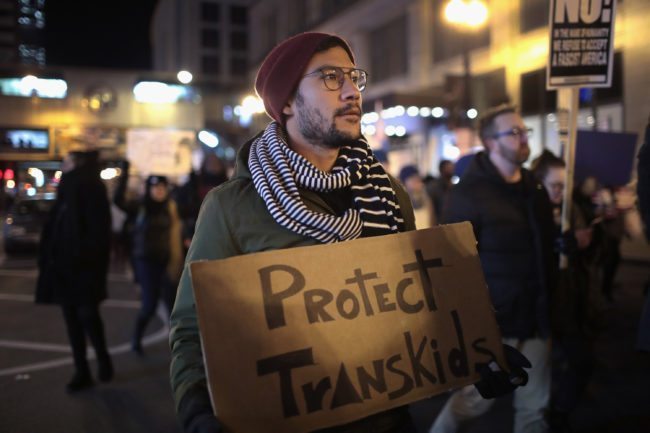
(Photo by Scott Olson/Getty Images)
Related: Want to stop transphobia at work? There’s an app for that
Regarding healthcare, 42 percent of the sample said that although they would like to undergo medical surgery as part of their transition they have not pursued it out of fear of how their families would react.
One respondent, 21-year-old Stevie explained that they hid their gender identity from their family because they were scared they may become homeless, which is a very true reality for the trans community as 25 percent reported experiencing homelessness.
Stevie explained: “I get shouted at every single time I leave my house and threatened at least once a week. I try to closet myself from my family because I’m so close to getting kicked out.”
They added that the system of support and care for trans people really needed to change, especially for those who are vulnerable.
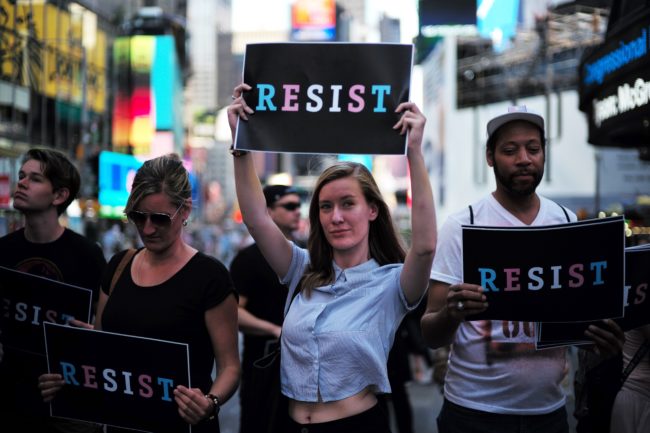
(Photo by JEWEL SAMAD/AFP/Getty Images)
“I can’t access hormone replacement therapy without going private. I’m disabled. It’s a lot to deal with and I’m crumbling under the stress but I consider myself a warrior. But really, something needs to change,” they said.
Two in five also said that when accessing health care they found that professionals often lacked understanding of trans health requirements.
Willow, 40, explained that although they were happy to see the incredible progression in the fight for trans equality, the transphobia becoming more prominent in the media was having a detrimental effect on their mental health.
“Even just five years ago it was not safe for me to come out as trans, the pace of change has been amazing.
“Unfortunately, there now appears to be a backlash against that progress in the last year with hate from the media against trans increasing disturbingly in the last six months.
“This increasing transphobia is accelerating and is causing acute anxiety in my daily life,” they said.
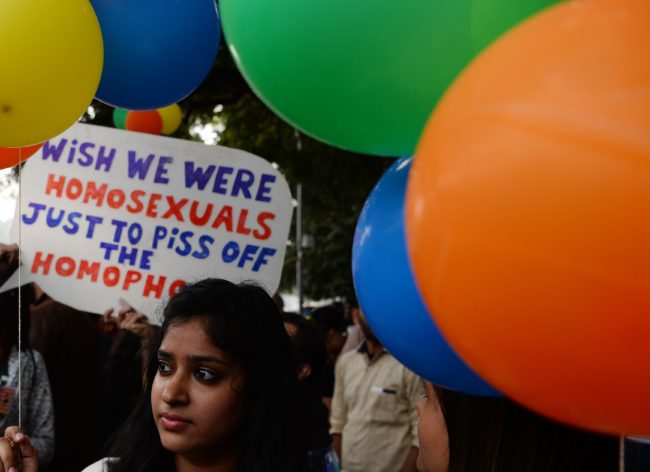
(Getty)
Related: Transgender people are being deleted from Tinder, and they’re furious
23-year-old Taylor, who lives in the south-east of the country, explained that they had faced transphobia.
They are one of a third of trans students in higher education who experienced transphobia from staff.
They said: “I have recently started at a new university. I was laughed at, ridiculed, and became the butt of jokes that normally gender me as a woman. This has been constant since day one.”
Ruth Hunt, chief executive of Stonewall, said the charity was calling on cisgender people to take a stand against anti-trans discrimination whenever they found it.
“It’s shameful that in Britain everyday activities like going to a cafe, having a peaceful day at work or accessing decent healthcare are made impossible for people simply because of who they are,” she said.
“It’s up to all of us to stand up as allies to trans people and making discriminating people because they are trans as unacceptable as it is to target someone because of their race or religion.”
Ruth Hunt, Chief Executive of Stonewall, said: “This report exposes the devastating levels of discrimination and abuse that many trans people are subject to across all areas of their lives. It’s shameful that in Britain everyday activities like going to a café, having a peaceful day at work or accessing decent healthcare are made impossible for people simply because of who they are.
“As we approach the consultation on the reform of the Gender Recognition Act, much of the public discussion has descended into vile, distorted and cruelly targeted transphobia. This report shows that this kind of commentary is not without consequence – it has a real and profoundly negative impact on the real-life experiences of trans people.
“If reading this report makes you angry and upset, then join us. It’s up to all of us to stand up as allies to trans people, and make discriminating people because they are trans as unacceptable as it is to target someone because of their race or their religion.”

